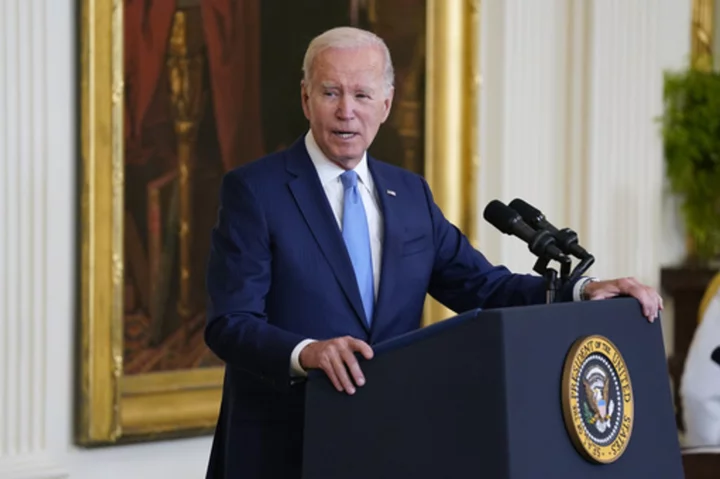
Novak Djokovic loses to Holger Rune, again, this time at Italian Open
Twenty-year-old Danish player Holger Rune recorded his second victory over Novak Djokovic in little more than six months by beating the 22-time Grand Slam champion 6-2, 4-6, 6-2 to reach the Italian Open semifinals
1970-01-01 08:00

Brazil's ministers see room for rate cuts as central bank keeps cautious stance
BRASILIA Brazil's economic ministers on Wednesday highlighted the potential for monetary easing to kick off, while the central
1970-01-01 08:00

Ackermann sprints home as crashes and Covid thin Giro field
Pascal Ackermann edged Jonathan Milan in a photo finish on stage 11 of the Giro d'Italia on Wednesday, as accidents and sickness...
1970-01-01 08:00

Anderson ready to miss Ireland Test in Ashes fitness bid
James Anderson said Wednesday he was willing to miss England's upcoming Test against Ireland if that means he has fully recovered from a groin strain...
1970-01-01 08:00

Bijan Robinson hyping up Roschon Johnson will have Bears fans over the moon
Chicago Bears fans have to be excited about Bijan Robinson's praise for their new running back.The Atlanta Falcons broke with recent tradition and gambled on a running back with their top-10 pick when the team selected Texas' Bijan Robinson eighth overall in April's NFL Draft. Whi...
1970-01-01 08:00

North Carolina Republicans approve 12-week abortion ban as sweeping restrictions spread across US South
Republican lawmakers in North Carolina voted to override the governor’s veto of a bill that outlaws abortion at 12 weeks of pregnancy, restricting abortion access in a state that has been a haven for abortion care in the year after the US Supreme Court’s decision to reverse Roe v Wade. In neighbouring South Carolina, lawmakers have continued debate before voting on a more-restrictive measure that would ban nearly all abortions after roughly six weeks of pregnancy, before many people know they are pregnant, adding to a streak of abortion restrictions across the US South. More than a dozen states, mostly in the South, have outlawed most abortions or severely restricted access within the year after the Supreme Court’s ruling in Dobbs v Jackson Women’s Health Organization, which revoked a constitutional right to abortion care that was affirmed for nearly half a century. Abortion rights restrictions in North Carolina and a six-week ban in South Carolina would dramatically change the map for abortion access in the US, where abortions are banned in most cases from Texas to West Virginia and along the Gulf Coast. “In the more than a dozen states with bans, women have been turned away from emergency rooms, left with no choice but to travel hundreds of miles for the care they need, and faced complications that put their lives and health at risk. Like those laws, the North Carolina ban will harm patients and threaten doctors for providing essential care,” White House press secretary Karine Jean-Pierre said in a statement on 17 May. She called the North Carolina measure a “dangerous bill that is out of touch with the majority of North Carolinians and will make it even more difficult for women to get the reproductive health care they need.” “We’ve already seen the devastating impacts that state abortion bans have had on the health and lives of Americans living under these draconian laws,” she added. Health workers joined protesters at the North Carolina Capitol in Raleigh on 17 May as lawmakers in the Republican-controlled state legislature convened to override a veto from Democratic Governor Roy Cooper, who has spent the last several days campaigning for GOP lawmakers to break from the party and drop the challenge to his veto. In a video posted online, the governor named four Republican lawmakers who he said made campaign promises to protect access to abortion. “They say this is a reasonable 12-week ban. It’s not,” he said in the video. “The fine print requirements and restrictions will shut down clinics and make abortion completely unavailable to many women at any time, causing desperation and death.” Much of the coverage surrounding the North Carolina legislation has centred around a now-Republican lawmaker who previously campaigned against abortion restrictions when she was a Democrat, up until April. State Rep Tricia Cotham joined the Republican Party last month after campaigning for her seat as a Democratic candidate and earning the endorsement of EMILY’s List, an influential abortion rights organisation. Her party switch delivered Republicans a veto-proof majority in the House. Ms Cotham has spent years campaigning against abortion restrictions, with powerful testimony about abortion rights and her own medically necessary abortion experience, saying in one widely shared 2015 speech that “my womb and my uterus is not up for your political grab.” In a statement following the vote, the governor said that “North Carolinians now understand that Republicans are unified in their assault on women’s reproductive freedom, and we are energized to fight back on this and other critical issues facing our state.” Lawmakers in the House and Senate voted on party lines to reverse the governor’s veto. The bill includes exceptions for pregnancies from rape or incest or if there is a “life-limiting anomaly” in the fetus. It also will require in-person physician visits at least 72 hours before a procedural abortion, and doctors must also make real-time views of fetuses available and allow patients to listen to embryonic cardiac activity. North Carolina lawmakers approved the anti-abortion law while lawmakers in Nebraska debated a measure that coupled a 10-week abortion ban with a bill targeting gender-affirming care for trans youth, a proposal that inspired a nearly three-month-long filibuster in an effort to block it. Republican lawmakers ultimately broke through the filibuster on Tuesday night and voted in favour of the combined bill, which will head to a final round of votes before it heads to the desk of Republican Governor Jim Pillen, who intends to sign it into law. Meanwhile, in Louisiana, lawmakers recently refused to add rape and incest exceptions to its anti-abortion law, one of the most restrictive in the country. State lawmakers also overwhelmingly rejected attempts to clarify medical exceptions in the law, including a measure that would specifically allow providers to remove an ectopic or molar pregnancy, which cannot result in a successful birth. Read More Nebraska Republicans approve combined gender-affirming care ban and anti-abortion bill after epic filibuster Anti-abortion laws harm patients facing dangerous and life-threatening complications, report finds
1970-01-01 08:00

Piers Morgan reveals Cristiano Ronaldo wanted Arsenal move in 2022
Cristiano Ronaldo left Manchester United by mutual consent in November 2022, and prior to agreeing to join Saudi side Al Nassr, was open to a move to Arsenal, according to Piers Morgan.
1970-01-01 08:00

Ukraine grain deal to be extended for 2 months
An agreement has been reached to extend a deal that allows grain to be exported from Ukrainian ports in the Black Sea, according to Turkish and Ukrainian officials.
1970-01-01 08:00

U.S. Supreme Court declines to block Illinois assault weapons ban
By Andrew Chung The U.S. Supreme Court on Wednesday declined to block a Democratic-backed ban on assault-style rifles
1970-01-01 08:00

Prince Harry, Meghan pursued by photographers in cars in New York, spokesperson says
A spokesperson for Prince Harry and his wife Meghan says the couple were followed by photographers in cars in New York
1970-01-01 08:00

Biden 'confident' there will be no U.S. debt default
President Joe Biden said Wednesday that he was “confident” that the U.S. would avoid an unprecedented and catastrophic debt default, saying the talks were productive as he prepared to leave for a global summit in Japan
1970-01-01 08:00

In a first, women poised to become mayors of Philadelphia and Jacksonville
By Brendan O'Brien A Philadelphia Democrat who promised to hire more police has won her party's nomination for
1970-01-01 08:00
